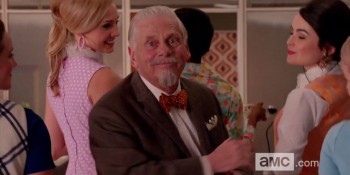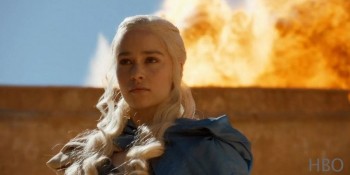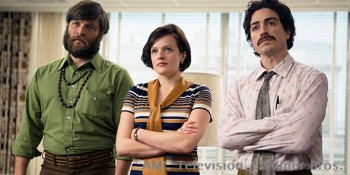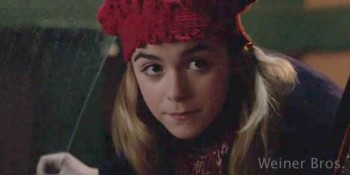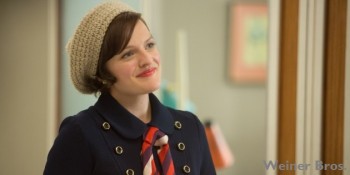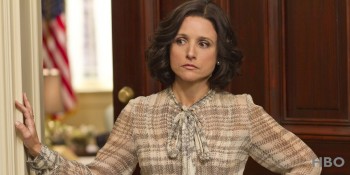Kevin and Mike have hit upon many of themes on display in Mad Men‘s mid-season finale. The episode was set in July 1969, inching us closer to the end of the turbulent decade in which Don Draper and his colleagues ruled the advertising world. Not unlike the John F. Kennedy assassination, the Apollo 11 moon landing presented Mad Men with a monumental moment in history in which to base a great episode of television.
Writers Carly Wray and Matthew Weiner did not miss their chance. “Waterloo” was, by far, the best episode we’ve seen in season 7, and it serves as a great midseason resting place before we pick the story back up next year.
We’ll surely miss Bert Cooper, won’t we? Just a few weeks ago, I was incensed at the man’s ugly implication that women of color shouldn’t be the public face of a company. Now, as Bert’s fate is forever sealed and connected to space exploration, I cannot help but think that Bert’s sentiments throughout the season — and over the course of the previous six — were nothing more than a sign of the times in which he lived, for better or worse.
While the Napoleon analogy was fitting, it was Bert’s simple utterance of “Bravo” that struck a chord in me. Here he was, a man who had devoted his entire working life to the world of advertisement, sitting on the couch listening to Neil Armstrong deliver the single greatest “catchphrase” of the 20th century. What else was there for Bert to say? Bravo, indeed.
Where other episodes this season have felt overly focused on one or two main characters, the midseason finale was the first one in which every main character was given something meaningful to say or do, and it was a delight to watch. The multiple-episode buildup to the Burger Chef pitch was executed perfectly. Realizing that he may still be a dead man walking, Don handed over the reigns to Peggy, his protege and, dare I say, his friend?
And Peggy delivered with a pitch unlike anything we’ve seen on the show since Don’s season 1 finale pitch to Kodak (still one of the best scenes of Mad Men ever produced). It seemed to me that there was a lot of closure in that Burger Chef scene. When Peggy gave Don that look, mid-pitch, and he nodded his head as if to say, “You got this,” it felt to me as if a torch had been passed.
Another torch that may have been passed is that of “leader” — from Bert to Roger. Just before he gave the Napoleon speech, Bert lobbed a truth bomb at Roger: he may be successful and charming, but unlike Bert, Roger is not a leader. In some sense, I think Roger agreed with that sentiment. But it still hurt to hear his mentor tell him that so bluntly. And it may very well have been that stinging rebuke that led Roger to once again seek out Jim Hobart from McCann Erickson and put in place yet another buyout of SC&P. Like many of the themes and character arcs in Mad Men, the “buyout/take over” is a storyline we’ve flirted with before — most notably when the company was almost sold to McCann at the end of season 3.
There seemed to be some urgency, though, to the move this time. Without Bert’s vote, Roger could not guarantee Don’s safety in the agency. Orchestrating the buyout from McCann allowed Roger to undercut Jim Cutler and his plan to oust Don. It also allowed Roger and the others to make a massive amount of money.
For an episode that culminated with an imaginary Bert Cooper singing about the best things in life being free, much of “Waterloo” was focused on money. Nowhere was this more evident than in the partners’ meeting Roger called to announce the possible buyout. Roger explained money as a primary factor in the sale. Joan and Pete nearly high-five each other to death at the prospect of their shares. Even Cutler ultimately voted for the deal, saying, “It’s a lot of money.” Maybe it’s not Don who needed that life-lesson song-and-dance from Mr. Cooper.
But ultimately, it was Don — fresh from talking a dejected, hesitant Ted Chaough into accepting the buyout — who was startled to hear, “Don, my boy,” in Bert’s unmistakable voice. We were treated to a short musical number, where a shoeless Bert serenaded Don with “The Best Things in Life are Free” before sauntering off and closing the door of his old office. I’m sure I wasn’t the only one left with a dropped jaw. I can’t imagine a riskier move for a show to take before a 10-month hiatus. But in addition to giving the wonderful Robert Morse a moment to shine, the song and its lyrics seemed to be a straightforward warning to Don: this buyout, and all of the money that will come with it, won’t fill the void. Embrace the free stuff.
Don’s road to redemption (who’s getting sick of that word?) seems to be moving swiftly, for sure. Yes, he will soon be twice-divorced, but his career prospects are once again red-hot. So what’s left?
When Breaking Bad took its final midseason hiatus, the show seemed to be working toward an inevitable climax: Walter White’s death. I don’t think the same can be said for this show. I have no doubt that Weiner has an endgame in mind, but all I can do is guess where he’s headed. And if this midseason finale is any indication, Mad Men — in a fitting tribute to the way the show has been executed for the better part of six seasons — will end not with a bang, but with a subtle, calculated, and soul-stirring whimper.
I think I’d be just fine with that.
